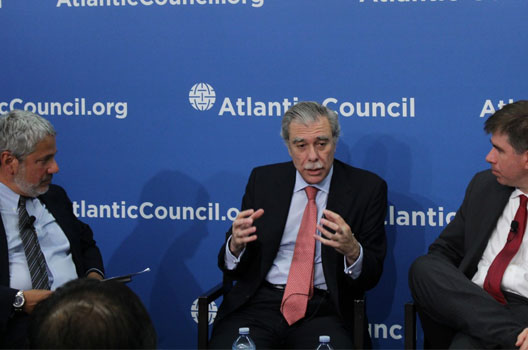
To build on this campaign, and to mark the beginning of a series, the Atlantic Council Adrienne Arsht Latin America Center held a two-panel event welcoming experts on US national security and US economy on Monday, June 27, 2016 from 4:30 p.m. to 6:00 p.m. at the Atlantic Council headquarters in Washington, DC.
Following Jason Marczak’s introductory remarks, Mary Jordan, National Correspondent at The Washington Post, moderated the first panel, “National Security Next Door: US-Mexico Ties.” This panel featured two former Secretaries of Homeland Security, The Honorable Michael Chertoff and The Honorable Tom Ridge, and the first Director of National Intelligence, Ambassador John Negroponte.
The discussion began with the question: “How does Mexico affect the ordinary American?” Ambassador Negroponte emphasized that bilateral trade and regional agreements like NAFTA have been an important source of US jobs. While security cooperation has always presented a larger challenge, examples including the Merida Initiative highlighted improvement in this arena.
The conversation turned quickly of course to the now-renowned “wall.” Governor Ridge responded with concern, saying “It is in our best interest to secure the border, try to manage it the best way we can but let’s do it in a way that doesn’t impede our trade relationships” Leaving no room for discrepancies, he added “you don’t want to build a wall with a neighbor.”
All three panelists endorsed the idea that smarter, increased flow of goods and people—and not a shutdown at the border—would be most beneficial to both the United States and Mexico. Secretary Chertoff recommended expanding the list of goods and persons with pre-clearance, thereby facilitating faster and safer exchanges.

From left to right, Peter Schechter, Director of the Atlantic Council Adrienne Arsht Latin America Center; Carlos Gutierrez, Former US Secretary of Commerce; and Jay Shambaugh, member of the Council of Economic Advisors.
The second panel “Footing the Bill: The Prominence of the US-Mexico Economic Relationship” featured Former US Secretary of Commerce, Carlos Gutierrez and Jay Shambaugh, member of the Council of Economic Advisers.
Peter Schechter, Director of the Adrienne Arsht Latin America Center, moderated this second panel and spearheaded the conversation by asking what de-linking ourselves from Mexico’s economy would mean for our country. Secretary Gutierrez’s blunt response was clear: “It’ll be a disaster if we somehow cut trade relations with Mexico.” Agreements like NAFTA facilitate the free flow of goods and services which allow American businesses to thrive, supporting 14 million American jobs. Political rhetoric has been threatening these agreements, and ending them would be detrimental to the US economy.
The discussion moved to address the economic implications of the wall. Secretary Gutierrez shared the belief with the former panelists that “the problem we have to understand is not that the wall is not high enough. It’s that our laws don’t work, they are outdated.”
Turning to the relationship between workforce productivity and immigration, both Secretary Gutierrez and Dr. Shambaugh expressed frustration with outdated legislation and its negative impact on the American economy. Security Gutierrez illustrated this point by noting that the agricultural sector needs one million workers for harvest season, and most of these jobs are filled by immigrants; however, US law only permits one-tenth of that number into the country legally, creating an impossible situation for many US farmers lacking either the workers they need or legal options or both.
“If you reform immigration now, you will have much higher productivity,” said Dr. Schambaugh, emphasizing that the discussion about immigration and economic growth are inextricable.
Picking up on the central themes of the economic discussion, Secretary Gutierrez addressed the anti-immigration and anti-trade rhetoric which has dominated Donald Trump’s campaign.
“Trump rhetoric is so alarming because if there are two things that have helped this economy for the last two hundred years, it’s immigration and it’s trade. And those are two things he wants to go after.”
Both panels clearly outlined how keeping strong, stable ties, improving the immigration system, and expanding military and security ties with Mexico are vital to US economic strength and security.
The event was best summarized by Ambassador Negroponte’s final comment responding to Trump’s attack on the Latino community living in the US: “It behooves us not only economically, security, or politically, but socially, to take into proper account the presence and the contribution of the Latino and Hispanic community in our country.”
Image: From left to right, Mary Jordan, National Correspondent at The Washington Post; Ambassador John Negroponte, first Director of National Intelligence; The Honorable Michael Chertoff, former Secretary of Homeland Security; and The Honorable Tom Ridge, former Secretary of Homeland Security.
